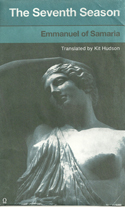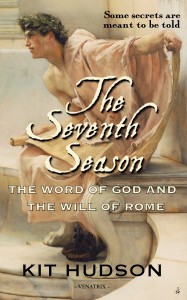In February 2013, I received a letter from the executor of Kit Hudson’s will informing me that I was one of the beneficiaries. This was a surprise as I had only ever met Kit – a distant relative of my partner – on one occasion.

Kit Hudson, c1982
Our meeting at Kit’s home in Kardamyli in Greece in the summer of 2002 was one of those wonderful nights where you lose yourself in wine and conversation as the sun sets and the stars brighten. By the time we went to bed, Kit and I realised we had much in common – a love of myth and legend, a passion for ancient history, and belief that the canonical Bible is not necessarily the best source for facts about the birth of Christianity. I realise now that Kit was interviewing me for the job I have now taken on – trying to bring The Seventh Season to as wide an audience as possible.
A few weeks after I received the executor’s letter, a crate arrived from Greece containing a gallon of oil pressed from olives grown in Kit’s garden, about two dozen bars of soap made from the same harvest of olives, a gallon of vinegar from a vineyard above Stoupa, and – at the bottom of the crate – an old leather box. When I opened the box, the first thing I saw was a handwritten note that simply said:
Some secrets are meant to be told
Beneath the note were several hundred type-written pages of yellowed foolscap paper, and as I began to read I realised I had real treasure in my hands. My partner remembered stories from childhood about ‘Cousin Kit’ having to go into hiding after publication of a controversial book. I starting asking other relatives for their memories of Kit, and found out a little more about the original publication of The Seventh Season in 1965. Having now read the text, I am surprised anyone found it controversial enough to condemn it, but it seems some of the threats against Kit were personal and specific, prompting the move to Greece (and presumably the disappearance of the Aksum scrolls?). Nevertheless, I immediately knew I had to find a way of re-publishing the text.

1965 edition
Despite the family connection, it has been very difficult to find out much about Kit. I can’t even be sure that referring to Kit as ‘him’ is accurate.
Kit was born in Kenya the 1930s. I believe Kit was christened Katharine and was the third of four children. Her two older brothers were extremely academic (the eldest, Richard was involved in early computer programming at Cambridge) and even though Kit was just as bright, it seems the family’s expectation was that she would marry and not be in need of an education. Kit had other ideas, and went to stay with friends in America she had met on an archaeological dig (probably in Carthage, but certainly somewhere in north Africa). It seems that anyone who met Kit after her time in America assumed that she was a he.
When I met Kit in 2002, everyone used the male pronoun to refer to him. Some in the Hudson family have wondered if Kit was a lesbian who found it impossible to come out, others if he was a hermaphrodite, or whether he was transexual at a time when society didn’t have the ability – or the words – to deal with someone so outside the norm. He had lived with a companian, Lydia, for over 30 years. I am pretty sure they were a couple, and Lydia was not – as was claimed – Kit’s housekeeper.
Kit never did go to university formally, but through his connections in America spent time enjoying lectures at Princeton, and through his brothers at Cambridge he became a gifted linguist. Greek, Latin, Phoenician, Aramaic and Egyptian hieroglyphs were all mastered along with many forgotten tongues from the past (not to mention the Oromo and Swahili from his time in Kenya). Had Kit studied formally, it seems he would have garnered many degrees from several prestigious institutions, but he instead chose of life of adventure and spent most of his twenties on archaeological digs around the Mediterranean. Following the publication of The Seventh Season, it seems Kit kept a low profile and lived a simple life in Greece reading, gardening, cooking, studying and writing letters to colleagues and relatives. He displayed no anger or frustration about the events of 1965; in fact, it would appear that he greatly enjoyed both his anonymity and his exile.


